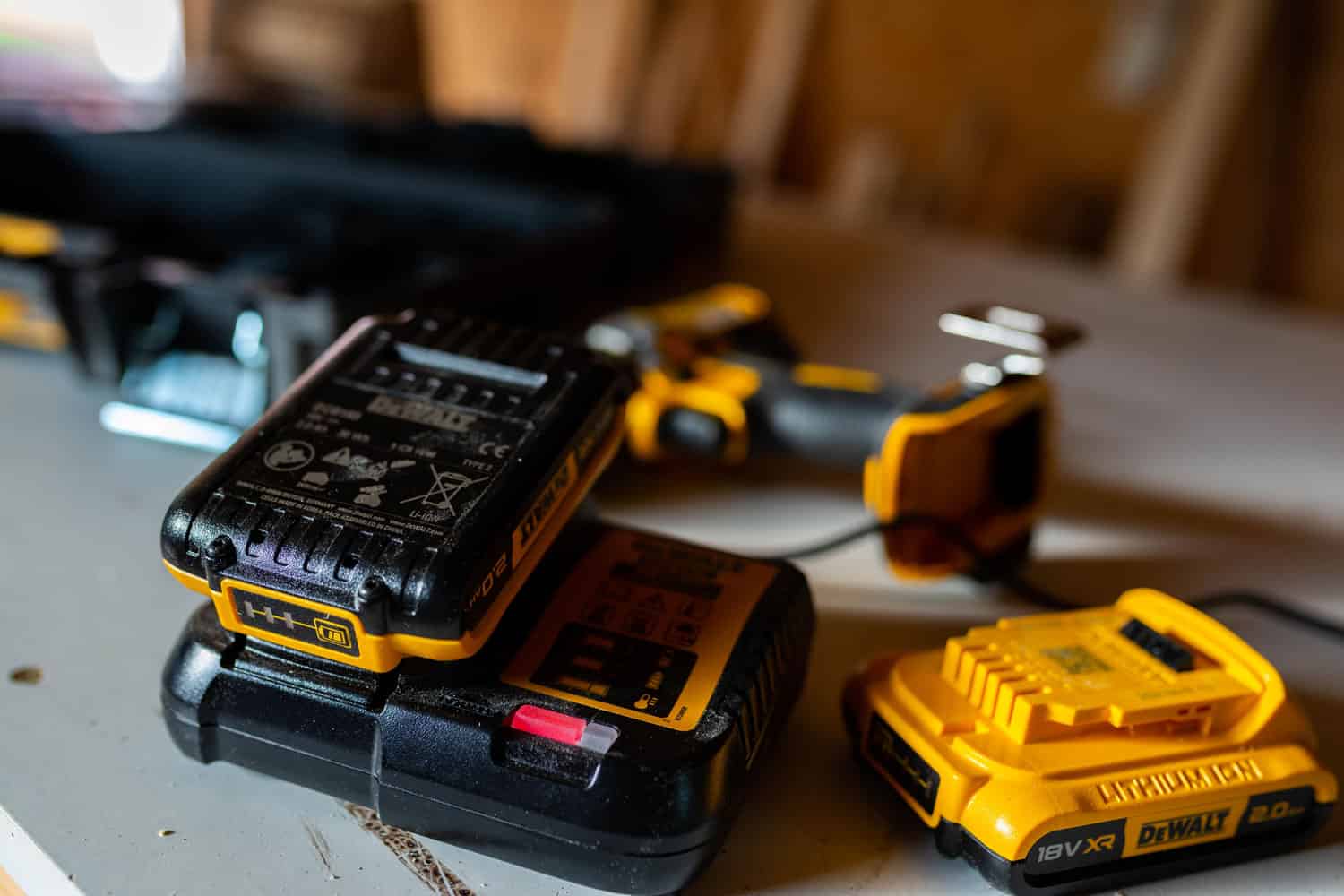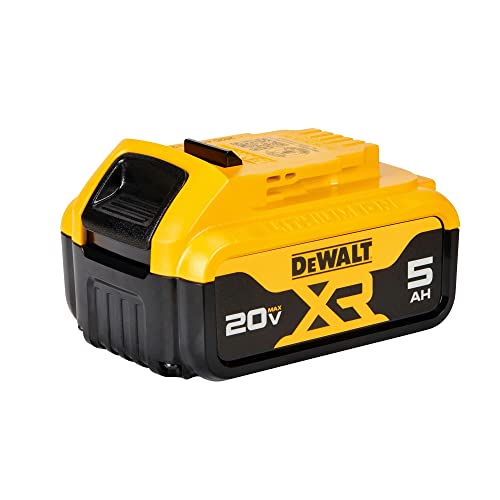Are you hearing a strange noise from your Dewalt battery charger when you try to plug it in?
Don't worry, you're not alone. Many Dewalt users have reported hearing a high-pitched whining noise using their chargers.

But what causes this noise, and is it something to be concerned about? Let's find out!
Is It Normal for My Dewalt Battery Charger to Make a Noise When Charging?
The noise you hear when using your Dewalt battery charger is most likely a coil whine, which comes from the windings of the transformer inside the charger.
While it can be annoying, coil whine is typically not a cause for concern.
It's most likely the charger needs to work harder to increase the voltage for charging, which could also suggest the battery is nearing the end of its life.
However, if you notice any other strange noises or smells coming from your charger, it may indicate underlying issues.
Continue reading: How Long Does A DeWalt Battery Last?
What Causes the Noise in My Dewalt Battery Charger While It's Charging?
There are several reasons why your Dewalt battery charger might make noise while charging. Below, we've discussed a few.
Electrical Humming
Electrical humming is one of the most common reasons a Dewalt battery charger makes a noise while charging.
As mentioned, the coil whine or the humming sound results from the transformer inside the charger.
The transformer's primary role is to adjust the voltage of AC power.
As it does its job, the windings inside the transformer can vibrate, producing this humming sound. This phenomenon is standard and usually not a cause for concern.
Weak or Bad Capacitor
If you're hearing a high-pitched noise from the charger, a weak or malfunctioning capacitor might be the culprit.
Capacitors in the charger are designed to store and discharge energy. When they don't work as they should, this can lead to noise.
Power Supply Fluctuations
Inconsistent power supply to the charger can also lead to noises, especially in places where the electrical supply is a bit unpredictable.
If the power fluctuates, it might cause the charger to produce audible sounds.
Overheating
Overheating is another concern. If the charger or the battery emits a hissing or sizzling sound, it could be getting too hot.
It could result from a too-fast charging process, a malfunctioning charger, charging in a hot environment, or even direct sunlight exposure.
Overheating is a serious issue. If you suspect this is the case, it's best to stop charging immediately to ensure safety.
Which Noises Indicate My Dewalt Charger Is Faulty?
When figuring out if your DeWalt charger might be acting up, it's essential to listen carefully for certain noises that could be red flags.
First, pay attention if you hear a high-pitched whining noise; it could mean your charger is overworked or overheating, potentially affecting its performance and safety.
Hissing noises are particularly concerning. If you hear a hissing sound from the battery, especially during charging, it might be venting, which is a significant safety hazard.
In such cases, it's vital to disconnect the battery immediately and take safety precautions.
If you notice any of these unusual sounds, it's best to stop using the charger immediately and contact DeWalt or an authorized service center.
How to Assess Potential Issues When Your DeWalt Makes Noises During Charging?
Here's how you can assess if the noises your DeWalt makes during the charging process are something you should be concerned about.
Step 1: Observe the Type and Volume of Noise
Start by carefully listening to the noises your DeWalt battery charger is making during the charging process.
Different noises can indicate different issues.
For example, a slight humming or fan noise is often normal as the charger operates, but if you hear loud, irregular clicking, popping, or hissing sounds, it might be a sign of trouble.
Note the type and volume of the noise to help identify potential issues.
Step 2: Monitor the Charging Process
While the battery is charging, keep a close eye on the charging indicator lights or display (if available) to ensure it's progressing as usual.
A steady, consistent charge with no interruptions is generally a good sign.
If the charging process seems to be taking significantly longer than usual or if the indicator lights behave erratically, it could be an indication of a problem.
Step 3: Inspect for Physical Damage
Examine both the charger and battery for any physical damage or abnormalities.
Check the charger for any visible damage, loose connections, or bent pins that might be causing the unusual noises or charging issues.
Similarly, look for cracks, bulges, or deformities in the battery casing, which can suggest internal problems.
Step 4: Contact DeWalt or an Authorized Service Center
If you are unsure about tackling the issues on your own or suspect a significant problem, it's advisable to contact DeWalt's customer service or an authorized service center.
They have the expertise to diagnose the issue properly, offer the necessary repairs or replacements, and ensure your charger and battery operate safely and efficiently.
How Do I Know If My Dewalt Battery Is Not Charging?
If you suspect that your Dewalt battery is not charging, there are a few things you can do to check.
Some signs that your battery is not charging properly include the following.
- The charger shows no lights or indicators when you plug in the battery.
- The battery is not fully charged even after charging it for a long time.
- You hear a strange noise or clicking sound when you plug in the battery to the charger.
What to Do If My Dewalt Battery Won’t Charge?
If you're having trouble charging your Dewalt battery, don't worry; there are several things you can do to fix it. Here are some steps you can take:
Check the Charger
Make sure that the charger is plugged in properly and that the outlet is working.
You can try plugging another device into the outlet to see if it works. If the outlet is not working, try a different one.
Check the Battery Contacts
The contacts may be dirty or corroded, preventing the battery from charging.
Use a clean, dry cloth to wipe the contacts clean. If the connections are corroded, use a small amount of rubbing alcohol to clean them.
Replace the Battery
If none of the above steps work, it may be time to replace it. Check your warranty to see if the battery is covered, and if not, purchase a new one.
Related article: Dewalt Battery Won’t Charge – Why? What To Do?
Is it OK to Leave the Dewalt Battery on the Charger Overnight?
Yes, you can leave the Dewalt battery on the charger overnight. DeWalt chargers have a maintenance mode that keeps batteries fully charged.
DeWalt NiCd batteries lose charge when left out: about 15-20% the first day and less after that. It's better to keep them in the charger.
But DeWalt's Lithium Ion batteries don't lose charge as quickly. Brushless tools technology also helps keep batteries in good shape.
Want your own DeWalt Lithium Ion battery? Click on the link below to learn more.
In Closing
If you hear your Dewalt battery charger making a noise while charging, don't worry right away.
It's common for the charger to produce a slight whining sound, especially during a fast charge.
But if the noise seems unusually loud or different, it could hint at an issue with either the battery or charger.
Always ensure you're using the right charger for your Dewalt battery, and keep an eye on it during the charge.
If anything seems off, stop charging and reach out to Dewalt customer support for help.

